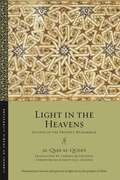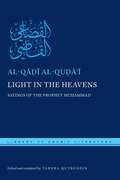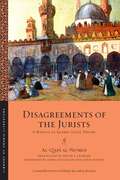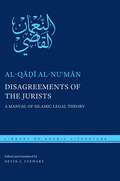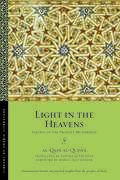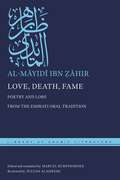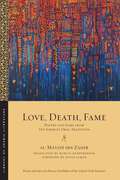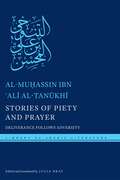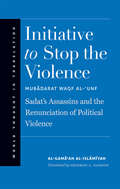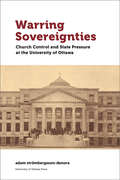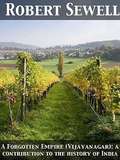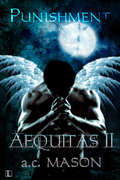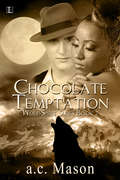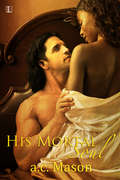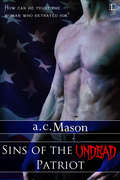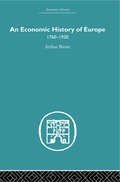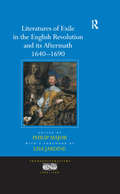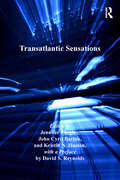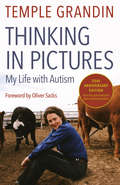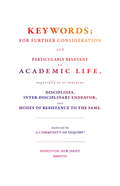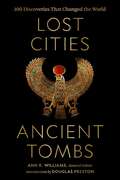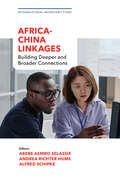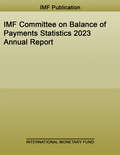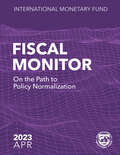- Table View
- List View
Light in the Heavens: Sayings of the Prophet Muhammad (Library of Arabic Literature #40)
by al-Qāḍī al-QuḍāʿīHumanitarian lessons and practical insights from the prophet of IslamThe words of Muhammad, messenger of God and prophet of Islam, have a special place in the hearts of his followers. Wielding an authority second only to the Qur'an, they are cited by scholars in a vast array of disciplines—including law, theology, metaphysics, poetry, grammar, history, and medicine—and are quoted by Muslims to one another in their daily lives. Light in the Heavens by al-Qadi al-Quda'i, a Sunni judge in the Fatimid court in Egypt, is an outstanding example of a compilation of these sayings, known as hadiths, that circulated orally and were later assembled and written down. From North Africa to India, generations have used Light in the Heavens as a teaching text for children as well as adults, and many of its 1,200 sayings are familiar to individuals of diverse denominations and ethnicities. For Muslims—who consider Muhammad’s teachings the fount of wisdom and the beacon of guidance in all things, mundane and sublime—these sayings provide a direct window into the inspired vision of one of the most influential humans to have walked the Earth. An English-only edition.
Light in the Heavens: Sayings of the Prophet Muhammad (Library of Arabic Literature #8)
by al-Qāḍī al-QuḍāʿīSayings of the Prophet Muhammad, wielding an authority second only to the Qur'an.The words of Muhammad (d. 11/632), God's messenger and prophet of Islam, have a special place in the hearts of his followers. Wielding an authority second only to the Qur'an, Muhammad’s hadith are cited by scholars as testimonial texts in a vast array of disciplines—including law, theology, metaphysics, poetry, grammar, history, and medicine—and are quoted by Muslims to one another in their daily lives.Assembling Muhammad’s words has been a major preoccupation for scholars throughout the fourteen centuries since his death, resulting in an abundance of compilations. Among the legally-grounded collections, which aimed to guide the community in its practice of religious law and ritual worship, one which stands out in particular is Light in the Heavens (Kitab al-Shihab) by al-Qadi al-Quda'i, a Shafi'i judge in the Fatimid court in Egypt. The collection’s overall conceptualization is distinctively ethical and pragmatic, and offers humanitarian lessons and practical insights with universal appeal.From North Africa to India, generations have used Light in the Heavens as a teaching text for children as well as adults, and many of its 1200 sayings are familiar to individuals of diverse denominations and ethnicities. For Muslims—who consider Muhammad’s teachings the fount of wisdom and the beacon of guidance in all things, mundane and sublime—these sayings provide a direct window into the inspired vision of one of the most influential humans to have walked the Earth.A bilingual Arabic-English edition.
Disagreements of the Jurists: A Manual of Islamic Legal Theory (Library of Arabic Literature #22)
by al-Qāḍī al-NuʿmānA masterful overview of Islamic law and its diversityAl-Qadi al-Nu'man was the chief legal theorist and ideologue of the North African Fatimid dynasty in the tenth century. This translation makes available for the first time in English his major work on Islamic legal theory (usul al-fiqh), which presents a legal model in support of the Fatimid claim to legitimate rule.Composed as part of a grand project to establish the theoretical bases of the official Fatimid legal school, Disagreements of the Jurists expounds a distinctly Shi'i system of hermeneutics. The work begins with a discussion of the historical causes of jurisprudential divergence in the first Islamic centuries and goes on to engage, point by point, with the specific interpretive methods of Sunni legal theory. The text thus preserves important passages from several Islamic legal theoretical works no longer extant, and in the process throws light on a critical stage in the development of Islamic legal theory that would otherwise be lost to history.An English-only edition.
Disagreements of the Jurists: A Manual of Islamic Legal Theory (Library of Arabic Literature #53)
by al-Qāḍī al-NuʿmānA masterful overview of Islamic law and its diversityAl-Qadi al-Nu'man was the chief legal theorist and ideologue of the North African Fatimid dynasty in the tenth century. This translation makes available in English for the first time his major work on Islamic legal theory, which presents a legal model in support of the Fatimids’ principle of legitimate rule over the Islamic community. Composed as part of a grand project to establish the theoretical bases of the official Fatimid legal school, Disagreements of the Jurists expounds a distinctly Shi'i system of hermeneutics, which refutes the methods of legal interpretation adopted by Sunni jurists. The work begins with a discussion of the historical causes of jurisprudential divergence in the first Islamic centuries, and goes on to address, point by point, the specific interpretive methods of Sunni legal theory, arguing that they are both illegitimate and ineffective. While its immediate mission is to pave the foundation of the legal Isma'ili tradition, the text also preserves several Islamic legal theoretical works no longer extant—including Ibn Dawud’s manual, al-Wusul ila ma'rifat al-usul—and thus throws light on a critical stage in the historical development of Islamic legal theory (usul al-fiqh) that would otherwise be lost to history.A bilingual Arabic-English edition.
Light in the Heavens: Sayings of the Prophet Muhammad (Library of Arabic Literature #40)
by al-Qadi al-Quda'iHumanitarian lessons and practical insights from the prophet of Islam <p><p>The words of Muhammad, messenger of God and prophet of Islam, have a special place in the hearts of his followers. Wielding an authority second only to the Qur'an, they are cited by scholars in a vast array of disciplines—including law, theology, metaphysics, poetry, grammar, history, and medicine—and are quoted by Muslims to one another in their daily lives. Light in the Heavens by al-Qadi al-Quda'i, a Sunni judge in the Fatimid court in Egypt, is an outstanding example of a compilation of these sayings, known as hadiths, that circulated orally and were later assembled and written down. From North Africa to India, generations have used Light in the Heavens as a teaching text for children as well as adults, and many of its 1,200 sayings are familiar to individuals of diverse denominations and ethnicities. For Muslims—who consider Muhammad’s teachings the fount of wisdom and the beacon of guidance in all things, mundane and sublime—these sayings provide a direct window into the inspired vision of one of the most influential humans to have walked the Earth.
Love, Death, Fame: Poetry and Lore from the Emirati Oral Tradition (Library of Arabic Literature #67)
by al-Māyidī ibn ẒāhirPoems and tales of a literary forefather of the United Arab EmiratesLove, Death, Fame features the poetry of al-Māyidī ibn Ẓāhir, who has been embraced as the earliest poet in what would later become the United Arab Emirates. Although little is known about his life, he is the subject of a sizeable body of folk legend and is thought to have lived in the seventeenth century, in the area now called the Emirates. The tales included in Love, Death, Fame portray him as a witty, resourceful, scruffy poet, at times combative and at times kindhearted.His poetry primarily features verses of wisdom and romance, with scenes of clouds and rain, desert migrations, seafaring, and pearl diving. Like Arabian Romantic and Arabian Satire, this collection is a prime example of Nabaṭī poetry, combining vernacular language of the Arabian Peninsula with archaic vocabulary and images dating to Arabic poetry’s very origins. Distinguished by Ibn Ẓāhir’s unique voice, Love, Death, Fame offers a glimpse of what life was like four centuries ago in the region that is now the UAE.A bilingual Arabic-English edition.
Love, Death, Fame: Poetry and Lore from the Emirati Oral Tradition (Library of Arabic Literature)
by al-Māyidī ibn ẒāhirPoems and tales of a literary forefather of the United Arab Emirates Love, Death, Fame features the poetry of al-Māyidī ibn Ẓāhir, who has been embraced as the earliest poet in what would later become the United Arab Emirates. Although little is known about his life, he is the subject of a sizeable body of folk legend and is thought to have lived in the seventeenth century, in the area now called the Emirates. The tales included in Love, Death, Fame portray him as a witty, resourceful, scruffy poet, at times combative and at times kindhearted. His poetry primarily features verses of wisdom and romance, with scenes of clouds and rain, desert migrations, seafaring, and pearl diving. Like Arabian Romantic and Arabian Satire, this collection is a prime example of Nabaṭī poetry, combining vernacular language of the Arabian Peninsula with archaic vocabulary and images dating to Arabic poetry’s very origins. Distinguished by Ibn Ẓāhir’s unique voice, Love, Death, Fame offers a glimpse of what life was like four centuries ago in the region that is now the UAE.An English-only edition.
Stories of Piety and Prayer: Deliverance Follows Adversity (Library of Arabic Literature #35)
by al-Muḥassin ibn al-TanūkhīUplifting tales from one of the most influential Arabic books of the Middle AgesOne of the most popular and influential Arabic books of the Middle Ages, Deliverance Follows Adversity is an anthology of stories and anecdotes designed to console and encourage the afflicted. Regarded as a pattern-book of Arabic storytelling, this collection shows how God’s providence works through His creatures to rescue them from tribulations ranging from religious persecution and medical emergencies to political skullduggery and romantic woes. A resident of Basra and Baghdad, al-Tanukhi (327–84/939–94) draws from earlier Arabic classics as well as from oral stories relayed by the author’s tenth-century Iraqi contemporaries, who comprised a wide circle of writers, intellectuals, judges, government officials, and family members. This edition and translation includes the first three chapters of the work, which deal with Qur'anic stories and prayers that bring about deliverance, as well as general instances of the workings of providence. The volume incorporates material from manuscripts not used in the standard Arabic edition, and is the first translation into English. The complete translation, spanning four volumes, will be the first integral translation into any European language.A bilingual Arabic-English edition.
Initiative to Stop the Violence
by Prof. Sherman Jackson al-Gama'ah al-IslamiyahFormerly one of the largest and most militant Islamic organizations in the Middle East, Egypt's al-Gama'ah al-Islamiyah is believed to have played an instrumental role in numerous acts of global terrorism, including the assassination of President Anwar Sadat and the 1993 World Trade Center bombing. In later years, however, the organization issued a surprising renunciation of violence, repudiating its former ideology and replacing it with a shari'a-based understanding and assessment of the purpose and proper application of jihad. This key manifesto of modern Islamist thought is now available to an English-speaking audience in an eminently readable translation by noted Islamic scholar Sherman A. Jackson. Unlike other Western and Muslim critiques of violent extremism, this important work emerges from within the movement of Middle Eastern Islamic activism, both challenging and enriching prevailing notions about the role of Islamists in fighting the scourge of extremist politics, blind anti-Westernism and, alas, wayward jihad.
Warring Sovereignties: Church Control and State Pressure at the University of Ottawa (Regional Studies)
by adam strömbergsson-denoraWarring Sovereignties explores the battle between religious and non-secular cultures for control of the university in the 1960s. Canon law, with particular emphasis on Oblate norms, was a clear expression of Catholic sovereignty in the university. While this sovereignty conditioned Oblate governance choices, the Government of Ontario became increasingly keen on reforming the University of Ottawa into a non-denominational corporation. Government pressure was coupled with shifting cultural expectations of the university’s social role, while an increasingly lay professorate helped put pressure on the Oblates from within. These twin pressures for removing religious control irked the Oblates, who put up stiff resistance, betraying their reticence to the liberalization of higher education. While the government valued social policy, the Oblates focused on educating individuals. Although the Oblates ultimately lost, history is as relevant as ever, and this book comes at a time when social planning is becoming increasingly prevalent within universities. Published in English.
A Forgotten Empire (Vijayanagar): A Contribution to the History of India
by Robert Sewell active 16th century Fernão Nunes active 16th century Domingos Paes"The fathers of the Church forbade the Hindus under terrible penalties the use of their own sacred books, and prevented them from all exercise of their religion. <P> <P> They destroyed their temples, and so harassed and interfered with the people that they abandoned the city in large numbers, refusing to remain any longer in a place where they had no liberty, and were liable to imprisonment, torture and death if they worshipped after their own fashion the gods of their fathers." wrote Sasetti, who was in India from 1578 to 1588.
Aequitas II Punishment: Punishment
by a.c. MasonWill the battle for aequitas freedom cost the balance between good and evil? Aequitas—part angel and demon, fight for their freedom and march to heaven's doorstep. Rebel leader Etienne Grant kidnaps his wife and vows to punish her disobedience. Once retribution is paid, Auria will command his army in a most ambitious venture—defeating all the angels in heaven. Auria can do nothing but surrender for the safety of her sons. Once in Grant's clutches, she realizes he wields an even greater whip as he fights for her heart and loyalty. Enemy alliances are forged as they prepare to bring down the Kingdom of God. But the archangels won't let victory slip from their grasp so easily. The battle for freedom might cost the balance between good and evil, but will it damn their souls for eternity?38,110 Words
Chocolate Temptation (Wolf Spirit #2)
by a.c. MasonWolf Spirit, #2 His by pack law, and he wants more than her body. Will she be able to surrender her heart? Switzerland, the winter of 1940. Alexia, a wolf-shifter, is mate to the Alpha of a powerful clan. Her life, the pack's future and the lives of countless children the pack smuggles out of Europe are in jeopardy. The Gestapo want her blood to breed an unstoppable regiment endowed with her gifts. Cathen, the pack's Epsilon Beta, is charged with protecting her. When Alexia's beloved mate is killed, Cathen becomes Alpha and by pack law, she is his new mate. On the run from the Gestapo's werewolves with Cathen, Alexia has no time to mourn. Can she resist what she's beginning to feel for her protector, despite her aching loss? Should she try? If she rejects him–not so easy to do do–he will die and the future of the pack she loves as family will be in danger. Cathen and Alexia's destinies are bound together, and to find peace and love amid the horror of war, she must accept her fate and heal her new mate.29,446 Words
His Mortal Soul
by a.c. MasonCan she save his immortal soul. . . and help him find heaven on earth? Touching Sephora may cost Kieran his soul. . . Kieran has always been a good Catholic, even studying for the priesthood. But there are complications. A few weeks before his ordination into the priesthood, he was made a vampire. And then there's Sephora, the beautiful, independent American student who draws him to her. His "blackbird", she seems to hold all the secrets to life and happiness, like the mythological creature of the ancient Celts. Despite his best intentions and though he knows he can only hurt her, her hold on him increases by the minute. Although Ireland promised Sephora an escape from the horrors of a brutal attack she suffered two years previously, she has discovered that the true scars lie within. But being with Kieran melts away the pain and his touch provides her the refuge to reclaim her body.17,336 Words
Sins of the Undead Patriot
by a.c. MasonTo save the President, Vaihan must trust the woman who betrayed him. Vaihan Louchian, Ancient Zombie and Special Advisor to the President, dabbles in contracts for Homeland Security in Washington DC, the only remaining demilitarized zone. His latest mission: to seduce delectable Leera Waltz so he can take down her boyfriend Rowley, leader of the anti-zombie terrorist movement. Vaihan and the President work the Bill of Undead Rights through the Senate, but terrorist attacks rise. The futures of the living and undead are in jeopardy, and Ms. Waltz is not all she seems. Vaihan canÆt help being more interested in rescuing her than in his assignment. Any human female who's willing to put up with the complications of lovemaking with him and his bouts of OCD is worth the hassle.Vaihan is powerful, intelligent and kind. So not what Leera expected of an undead. When she's forced to betray Vaihan, she knows he will never understand. She must return to Rowley, and slips deeper into the city's dark underworld. Then Vaihan's suspected in an assassination attempt against the President, and Leera has to find the courage to do what's right and save him, or lose not only Vaihan and the leader of the free world, but her heart and soul.101,868 Words
An Economic History of Europe 1760-1930
by a. BirnieA history of the rise of industrialism in modern Europe, containing a description of the revolutionary changes which transformed industry, commerce and agriculture at the beginning of the last century, with an account of their reactions on the political and economic condition of the chief European nations. The social problems created by this momentous revolution are discussed in detail, and a historical survey is given of the various attempts to correct the evils of industrialism, on the one hand through state intervention by means of poor laws, factory laws, schemes of social insurance, etc., and on the other through voluntary effort as manifested in movements like trade unionism, co-operation, profit sharing and co-partnership. Post-war developments such as the Russian Revolution and international labour legislation are also described in detail and depth. This book was first published in 1930.
Literatures of Exile in the English Revolution and its Aftermath, 1640-1690 (Transculturalisms, 1400-1700)
by a foreword JardineOriginal and thought-provoking, this collection sheds new light on an important yet understudied feature of seventeenth-century England's political and cultural landscape: exile. Through an essentially literary lens, exile is examined both as physical departure from England-to France, Germany, the Low Countries and America-and as inner, mental withdrawal. In the process, a strikingly wide variety of contemporary sources comes under scrutiny, including letters, diaries, plays, treatises, translations and poetry. The extent to which the richness and disparateness of these modes of writing militates against or constructs a recognisable 'rhetoric' of exile is one of the book's overriding themes. Also under consideration is the degree to which exilic writing in this period is intended for public consumption, a product of private reflection, or characterised by a coalescence of the two. Importantly, this volume extends the chronological range of the English Revolution beyond 1660 by demonstrating that exile during the Restoration formed a meaningful continuum with displacement during the civil wars of the mid-century. This in-depth and overdue study of prominent and hitherto obscure exiles, conspicuously diverse in political and religious allegiance yet inextricably bound by the shared experience of displacement, will be of interest to scholars in a range of disciplines.
Geography in Classical Antiquity
by Daniela Dueck a chapter by Kai BrodersenWhat were the limits of knowledge of the physical world in Greek and Roman antiquity? How far did travellers get and what did they know about far-away regions? How did they describe foreign countries and peoples? How did they measure the earth, and distances and heights on it? Ideas about the physical and cultural world are a key aspect of ancient history, but until now there has been no up-to-date modern overview of the subject. This book explores the beginnings and development of geographical ideas in Classical antiquity and demonstrates technical methods for describing landscape, topographies and ethnographies. The survey relies on a variety of sources: philosophical and scientific texts but also poems and travelogues; papyrological remains and visual monuments.
Transatlantic Sensations (Ashgate Series in Nineteenth-Century Transatlantic Studies)
by John Cyril Barton Kristin N. Huston a Preface ReynoldsBringing together sensation writing and transatlantic studies, this collection makes a convincing case for the symbiotic relationship between literary works on both sides of the Atlantic. Transatlantic Sensations begins with the 'prehistories' of the genre, looking at the dialogue and debate generated by the publication of sentimental and gothic fiction by William Godwin, Susanna Rowson, and Charles Brockden Brown.Thus establishing a context for the treatment of works by Louisa May Alcott, Mary Elizabeth Braddon, Dion Boucicault, Wilkie Collins, Charles Dickens, George Lippard, Charles Reade, Harriet Beecher Stowe and George Thompson, the volumetakes up a wide range of sensational topics including sexuality, slavery, criminal punishment, literary piracy, mesmerism, and the metaphors of foreign literary invasion and diseased reading. Concluding essays offer a reassessment of the realist and domestic fiction of George Eliot, Charlotte Yonge, and Thomas Hardy in the context of transatlantic sensationalism, emphasizing the evolution of the genre throughout the century and mapping a new transatlantic lineage for this immensely popular literary form. The book's final essay examines an international kidnapping case that was a journalistic sensation at the turn of the twentieth century.
Thinking in Pictures, Expanded Edition: My Life with Autism
by Temple Grandin a Foreword by Oliver SacksTemple Grandin, Ph.D., is a gifted animal scientist who has designed one third of all the livestock-handling facilities in the United States. <P> <P> She also lectures widely on autism--because Temple Grandin is autistic, a woman who thinks, feels, and experiences the world in ways that are incomprehensible to the rest of us. <P><P>In this unprecedented book, Grandin delivers a report from the country of autism. Writing from the dual perspectives of a scientist and an autistic person, she tells us how that country is experienced by its inhabitants and how she managed to breach its boundaries to function in the outside world. What emerges in Thinking in Pictures is the document of an extraordinary human being, one who, in gracefully and lucidly bridging the gulf between her condition and our own, sheds light on the riddle of our common identity.
Keywords;: For Further Consideration and Particularly Relevant to Academic Life, &c.
by D. Graham Burnett a Community of Inquiry Matthew Rickard Jessica TerekhovAn irreverent critical lexicon of academic life and cultureThe university: The very name evokes knowledge, culture, and the magnificently universal ambition at the heart of this essential institution. Bastions of free inquiry and a free society, engines of social transformation and economic progress, enclosed gardens of ennobling reflection and creation, universities encompass the wisdom of the past and the hope of the future. Or do they? This critical glossary—written by a group of Princeton graduate students and faculty—defines fifty-eight terms common to academic life in a style that will prick both egos and consciences. From “academia” to “vocation,” “canon” to “peer review,” “discipline” to “methodology,” the book scrutinizes the often stultifying structures of modern disciplinary life, calls out a slavish devotion to “knowledge production” as the enemy of thought, and even dissects the notion of “academic excellence.” Feisty and darkly funny, passionate and deeply insightful, this book raises hard questions about teaching, research, theory, practice, and academic labor. The result is a must-read dispatch from today’s academic trenches—one that is sure to provoke discussion and debate.
Lost Cities, Ancient Tombs: 100 Discoveries That Changed the World
by `Doglas Preston and ANN R. WilliamsBlending high adventure with history, this chronicle of 100 astonishing discoveries from the Dead Sea Scrolls to the fabulous "Lost City of the Monkey God" tells incredible stories of how explorers and archaeologists have uncovered the clues that illuminate our past. Archaeology is the key that unlocks our deepest history. Ruined cities, golden treasures, cryptic inscriptions, and ornate tombs have been found across the world, and yet these artifacts of ages past often raised more questions than answers. But with the emergence of archaeology as a scientific discipline in the 19th century, everything changed. Illustrated with dazzling photographs, this enlightening narrative tells the story of human civilization through 100 key expeditions, spanning six continents and more than three million years of history. Each account relies on firsthand reports from explorers, antiquarians, and scientists as they crack secret codes, evade looters and political suppression, fall in love, commit a litany of blunders, and uncover ancient curses. Pivotal discoveries include: King Tut's tomb of treasureTerracotta warriors escorting China's first emperor into the afterlifeThe glorious Anglo-Saxon treasure of Sutton-HooGraves of the Scythians, the real Amazon warrior womenNew findings on the grim fate of the colonists of JamestownWith a foreword from bestselling author Douglas Preston, Lost Cities, Ancient Tombs is an expertly curated and breath-taking panorama of the human journey.
Africa-China Linkages: Building Deeper and Broader Connections: [subtitle]
by [authors]A report from the International Monetary Fund.
Balance of Payments Statistics: [subtitle]
by [authors]A report from the International Monetary Fund.
